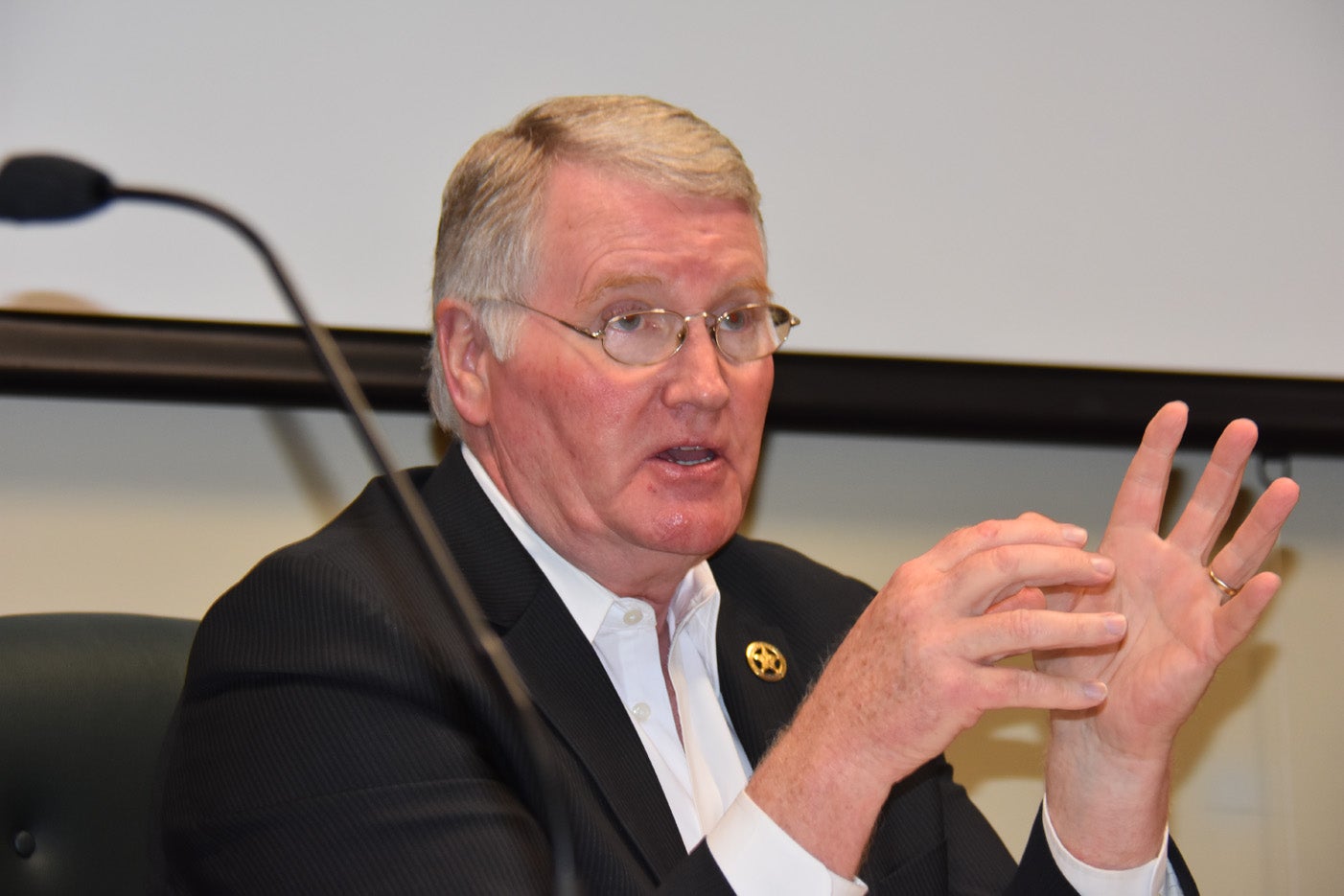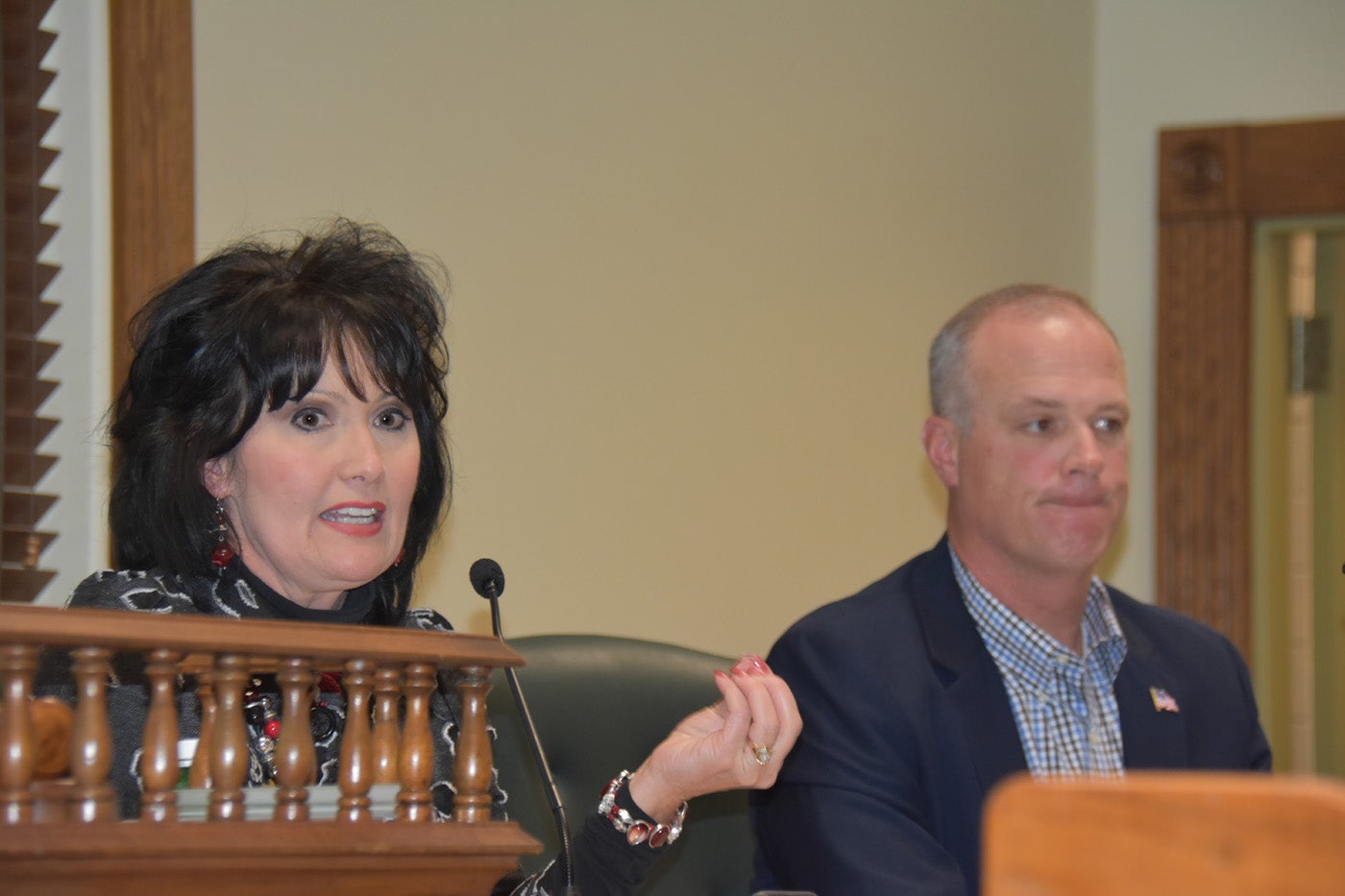Pension forums heat up in Nicholasville
Published 10:59 am Thursday, November 2, 2017
Monday evening, employees of Jessamine County gathered into the fiscal court room for a town hall forum featuring U. S. Sen.Tom Buford (R), of Senate District 22; Rep. Kim King (R), of House District 55, and Rep. Russ Meyer (D), of House District 39, regarding the proposed solution from the governor’s office to get the state out of its current pension crisis.
Rep. King held up and displayed a hard copy of the 505-page proposal, telling those in attendance that she had only read the first four pages. Neither Meyer nor Buford had read the document in its entirety either, but stated on record that they did not support it.
King pointed out that the proposal —a “working document” — was not being referred to as a bill in Frankfort at that time because it had no sponsors and had not been filed. She recommended that everyone view three one-hour programs on Kentucky Educational Television that offer an in-depth breakdown of the document, as well as the statewide pension problem as a whole.
“I completely understand where everyone in this room is coming from having had the opportunity to serve at city hall,” Meyer said. “The impact on the county is going to be over a million dollars a year — I don’t understand how you’re going to make it if that happens. For the city, it’s over $1.5 million, and we are trying to get ahead and dig in, in this community. To take another ten-plus steps backward would be a problem.”
“It’s a serious situation that is going to require a lot of money whether we pass this or don’t pass it,” Buford added.
Buford said that the million-dollar impact on the county would be broken down into a three-year payment plan of $330,000 per year, and the same for the city. He said that the payment plan would ease the blow slightly, but the payments were still a lot of money.
Under the proposal, county employees with hazardous duty such as law enforcement or emergency services, would see no changes to their current plan. For employees with non-hazardous job duties, however, changes would be drastic.
“I don’t think the votes are there yet to pass it,” Buford said. “On the Senate side, there may be 23 votes to pass it, and those are starting to get nervous. In the House, they don’t have enough votes, I was told this afternoon. They’re still working it.”
If the bill does get passed, the state would need even more money than is currently needed because of the reduction in workers to pay into the pension plan and due to the money needed for the state to participate in 401(a) retirement plans. Under those plans, employees can begin drawing out at the age of 52 without penalty. Employees with 27 years of tenure in before the year 2023 will get their full benefits for those 27 years, then they will enter into the 401(a) plan.
“I’m hearing numbers around $1.2 billion if we don’t do anything and continue to fund it like a checking account,” Buford said. “If we pass this, [the state will need] about $1.5 billion because we will need monies for the 401(a)’s.”
He said that there are rumors that Republicans in the House were working on another bill.
Sen. Buford stated that he is not a proponent of the proposal, and feels that there are other ways to correct the pension problem.
Rep. King said presented a letter that she had received from the Kentucky League of Cities stating that from a city perspective, the framework of the proposal released the prior week “provides a sound point for beginning more detailed discussions about the final version of possible reform.”
She said that letter shows that the League of Cities has been part of the discussion.
According to Meyer, the county will contribute about 19 percent to pensions for employees with non-hazardous duties, and closer to 40 percent for those with such positions. Those percentages may change, but the total dollar amount put in should be less.
“We’ve been through this over the past 10-15 years and had two rounds of pension reform,” Meyer pointed out. “We’ve come a long ways, but we need some time and a hard look at who this is impacting and how they have been impacted in the past, as well as the future of these professions. The scariest thing for me is, in five years, where are we going to be in this community with our public safety?”
The way the proposal is currently written, any county employee who can reach 27 years of tenure by the year 2023 will be able to draw retirement at that time if they desire. However, if an employee makes the decision to re-enter the state work force, only 100 hours of work per month will be allowed before pension is lost. For teachers, the allotment is 100 days due to the dire situation with substitute teachers.
“The funding is mandated and has to be in there at 100 percent every year,” Rep. King said of the state CERS (County Employee Retirement System). “That system is still only 57 percent funded, based on their own numbers. I think that’s a really good example of a terrible structural imbalance, and my one and only objective is to save your pensions and make sure you get your checks.”
One of the biggest topics asked about and discussed at the forum regarded the three percent that state employees would have to pay in to the system to fund the retirement of workers before them.
“Most of what I see of the plan is going to be pretty good, because it does protect our first responders and so forth,” County Attorney Brian Goettl said. “My only concern is the three percent surcharge that current employees are going to have to pay to pay for the health insurance of those who are retired. I don’t think that employees should be the only ones to bear the pain on taking up the tax burden.”
Buford said that he thought the three percent reduction in pay was unfair. King said that while she didn’t have specific information on the CERS, she had received data showing that the Teachers Retirement System health insurance is currently underfunded by $2.839 billion dollars, which explained the reasoning behind the three percent reduction in employee pay.
The impact on benefits for county employees is enormously detrimental, it was pointed out, because the benefits are the only reason many workers take the jobs in the first place because of the salary levels.
Sen. Buford was asked why his colleagues in the Senate were objecting to the proposal, and he said that the consensus was that there are individuals that started working thinking that they could draw a pension in 27 years, and the proposed measures would change that. In his opinion, he said that the potential bill would be taken to the Supreme Court if it were passed, and a article from Judge Larry VanMeter printed in the press suggests that the outcome for the bill would not be favorable.
“He has already told the governor that this is not going to meet the Constitutional mustard in this newspaper interview,” Buford said of VanMeter’s article. “If this passes I think you will see an immediate lawsuit by teachers, maybe Kentucky League of Cities, Association of Counties and some individuals who will have their pensions cut. Be concerned, but don’t be afraid yet because I don’t think this will meet the challenges in the court.”
When asked the uncertainty of receiving a pension, Buford explained that city and county governments can file for bankruptcy, but state government cannot. Workers, he said, must be paid even if it means closing the schools to cover obligations.
“But we won’t close the schools. We’ll figure out a way to make the money,” he said. “We can have tax increases — one penny is $300 million, and it goes on from there. We might leave about $2 billion on the table right now of taxes we ought to be collecting that we are not, and can move forward. It will make a lot of people mad, but we can get there.”
After the forum at the court house, Meyer, Buford and King conducted a similar session at West Jessamine High School to teachers and school staff from Jessamine, Mercer and Washington Counties. The nearly-full auditorium was vociferously unfavorable toward the potential bill, and at times to Rep. King, who would not state whether or not she would vote in favor of its passing.
According to Sen. Buford, the teachers were getting closer to having their pensions funded, and their trust fund was growing well for their health insurance needs. He said that he was extremely nervous about touching their retirement system.
Superintendent of Jessamine County Schools Matt Moore said that the legislation could potentially lead to an “exodus of our most experienced educators, result in multiple litigation suits distracting us from the work of educating our students and weaken an educational system that has made incredible gains.”
Everyone was given two-sided cards to show their response to points made during the forum, with a green side for agreement and a red side for disagreement. Much of the discussion was met with a sea of red.






